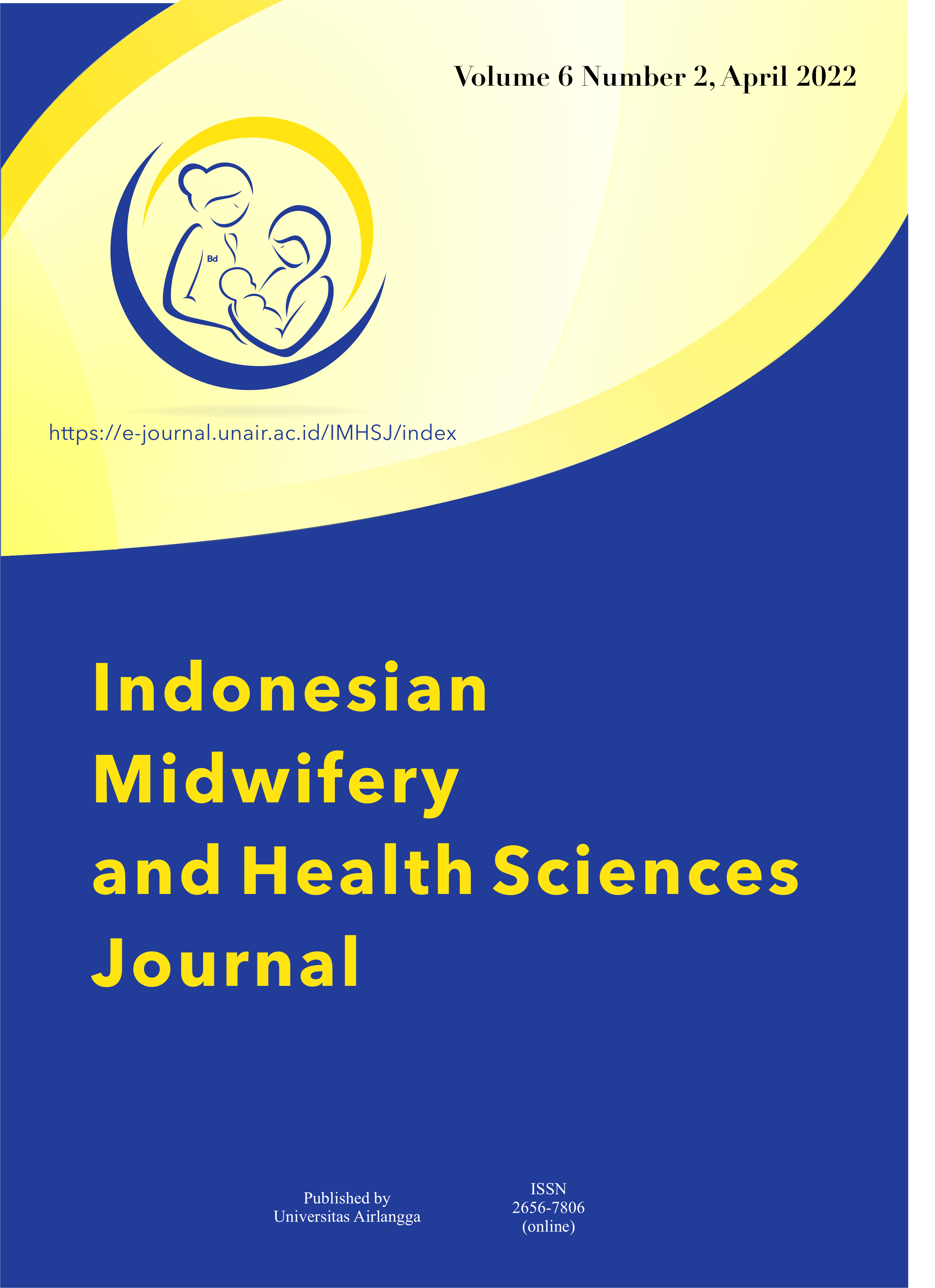WOMEN'S LIVES AFTER BEING DIAGNOSED WITH CERVICAL CANCER

Downloads
Abstract
Background: Cancer is the second leading cause of death worldwide after cardiovascular disease. Apart from difficulties in treatment, poor prognosis, and adverse side effects of treatment, cervical cancer also presents psychological challenges for patients. The experience of being diagnosed with cervical cancer is a dramatic event for a woman and causes stress for patient and family For this reason, the exploration of how women with cervical cancer interpret their experiences was deemed important to be investigated in-depth. . Method: This study used a qualitative research design with a phenomenological approach. Data collected by in-depth interviews with 7 participants. Data analysis techniques used are: verbatim, coding, categorization, composing thematic context and data interpretation.Results: This study revealed that the enforcement of cervical cancer diagnosis is always accompanied by psychological challenges, both for patients and their families. After being diagnosed with cervical cancer, participants experienced various changes in all dimensions of their lives, which included changes in daily activities, economic changes, sexual and spiritual activities. Conclusion: Cervical cancer affects and changes all aspects of women's lives and their families, therefore the care given to cervical cancer patients should be carried out holistically
Bae, H. and Park, H. (2015) ‘Sexual function, depression, and quality of life in patients with cervical cancer', Supportive Care in Cancer, 24(3), pp. 1277–1283. doi: 10.1007/s00520-015-2918-z.
Baldacchino, D. (2015) ‘Spiritual care education of health care professionals', Religions, 6(2), pp. 594–613. doi: 10.3390/rel6020594.
Bowman, K. F. et al. (2003) ‘Appraisal of the cancer experience by older long-term survivors', Psycho-Oncology, 12(3), pp. 226–238. doi: 10.1002/pon.630.
Chen, P. Y. and Chang, H. C. (2012) ‘The coping process of patients with cancer', European Journal of Oncology Nursing. Elsevier Ltd, 16(1), pp. 10–16. doi: 10.1016/j.ejon.2011.01.002.
Czerw, A. I. et al. (2017) ‘Pain , acceptance of illness , adjustment to life with cancer and coping strategies in prostate cancer patients', Arch Med Sci. doi: 10.5114/aoms.2016.58458.
Deshmukh, R. D. et al. (2018) ‘ScienceDirect Social support a key factor for adherence to multidrug- resistant tuberculosis treatment', Science Direct. Tuberculosis Association of India, 65(1), pp. 41–47. doi: 10.1016/j.ijtb.2017.05.003.
Fauziah, R. N. (2016) KECEMASAN PADA PENDERITA KANKER, eprints.ums.ac.id. Universitas Muhammadiyah Surakarta. Available at: http://eprints.ums.ac.id/43931/12/NASKAH PUBLIKASI.pdf.
De Faye, B. J. et al. (2006) ‘Stress and coping with advanced cancer', Palliative and Supportive Care, 4(3), pp. 239–249. doi: 10.1017/s1478951506060317.
Hodges, L. J., Humphris, G. M. and Macfarlane, G. (2005) ‘A meta-analytic investigation of the relationship between the psychological distress of cancer patients and their carers', Social Science and Medicine, 60(1), pp. 1–12. doi: 10.1016/j.socscimed.2004.04.018.
Hopman, P. and Rijken, M. (2014) ‘Illness perceptions of cancer patients: relationships with illness characteristics and coping', Psycho-Oncology, 24(June 2014), pp. 11–18. doi: 10.1002/pon.3591.
ICO/IARC (2018) ‘Inonesia: Human Papillomavirus and Related Cancers, Fact Sheet 2018 I. Key data on HPV and HPV-related cancers', pp. 6–7.
Jefford, M. et al. (2013) ‘Implementing improved post-treatment care for cancer survivors in England, with reflections from Australia, Canada and the USA', British Journal of Cancer. Nature Publishing Group, 108(1), pp. 14–20. doi: 10.1038/bjc.2012.554.
Khalil, J. et al. (2015) ‘Impact of cervical cancer on quality of life: beyond the short term (Results from a single institution)', Gynecologic Oncology Research and Practice. Gynecologic Oncology Research and Practice, 2(1), pp. 2–7. doi: 10.1186/s40661-015-0011-4.
Kusumaningrum, T. et al. (2016) ‘PERAN KELUARGA DAN KUALITAS HIDUP PASIEN KANKER SERVIKS (The Role of Family and Quality of Life in Patients with Cervical Cancer)', Jurnal Ners, 11(1), pp. 112–117. Available at: http://download.portalgaruda.org/article.php?article=467836&val=7436&title=PERAN KELUARGA DAN KUALITAS HIDUP PASIEN KANKER SERVIKS.
Linnet Olesen, M. et al. (2015) ‘The psychosocial needs of gynaecological cancer survivors: A framework for the development of a complex intervention', European Journal of Oncology Nursing. Elsevier Ltd, 19(4), pp. 349–358. doi: 10.1016/j.ejon.2015.01.007.
Myers Virtue, S. et al. (2015) ‘Emotion episodes during psychotherapy sessions among women newly diagnosed with gynecological cancers', Psycho-Oncology, 24(9), pp. 1189–1196. doi: 10.1002/pon.3737.
Novaes, H. M. D. et al. (2015) ‘Annual national direct and indirect cost estimates of the prevention and treatment of cervical cancer in Brazil', Clinics, 70(4), pp. 289–295. doi: 10.6061/clinics/2015(04)12.
Suhardin, S., Kusnanto and Krisnana, I. (2016) ‘ACCEPTANCE AND COMMITMENT THERAPY ( ACT ) MENINGKATKAN KUALITAS HIDUP PASIEN KANKER ( Acceptance and Commitment Therapy Improve the Quality of Life Patients Suffering Cancer ) Saverinus Suhardin *, Kusnanto *, Ilya Krisnana * Program Studi Pendidikan Ners', Jurnal Ners, 1(1), pp. 1–10. doi: http://dx.doi.org/10.20473/jn.v11i1.1341.
Susanti, E. (2017) GAMBARAN PENERIMAAN PASIEN AWAL TERDIAGNOSA KANKER SERVIKS DI POLI ONKOLOGI SATU ATAP (POSA) RSUD DR.SOETOMO SURABAYA. Universitas Airlangga.
Ussher, J. M. et al. (2015) ‘Perceived causes and consequences of sexual changes after cancer for women and men : a mixed method study', BMC Cancer, pp. 1–18. doi: 10.1186/s12885-015-1243-8.
WHO (2014) Cancer Country Profiles: Indonesia, Cancer Country Profiles. Available at: https://www.who.int/cancer/country-profiles/idn_en.pdf (Accessed: 27 February 2020).
Wood, A. W. et al. (2014) ‘Mindful Caring : Using Mindfulness-Based Cognitive Therapy with Caregivers of Cancer Survivors Survivors', Journal of Psychosocial Oncology, (January 2015), pp. 37–41. doi: 10.1080/07347332.2014.977418.
Copyright (c) 2022 ummu kulsum

This work is licensed under a Creative Commons Attribution-ShareAlike 4.0 International License.
1. The journal allows the author to hold the copyright of the article without restrictions.
2. The journal allows the author(s) to retain publishing rights without restrictions
3. The formal legal aspect of journal publication accessibility refers to Creative Commons Atribution-Share Alike 4.0 (CC BY-SA).
This Journal (e-ISSN 2656-7806) is licensed under a Creative Commons Attribution-ShareAlike 4.0 International License.
















